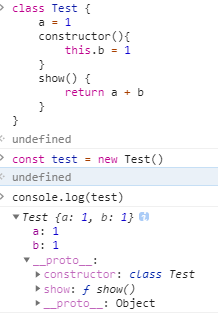Class 类
ES6 转 ES5 babel 工具
问题:
为什么子类的构造函数,一定要调用super()?
- ES6 在继承中强制要求,必须在子类调用 super(默认调用),因为子类的 this 是由父类得来的
- super 等价于 parent.prototype.constructor.call(sub)
- super 即可以作为函数调用,又可以作为对象调用
- 函数:只能在 constructor 内部调用
- 对象:别的方法内调用
super
super 关键字用于访问和调用一个对象的父对象上的函数
super.prop和super[expr]表达式在类和对象字面量任何方法定义中都是有效的。
语法
javascript
super([arguments]);
// 调用 父对象/父类 的构造函数
super.functionOnParent([arguments]);
// 调用 父对象/父类 上的方法描述
在构造函数中使用时, super 关键字将单独出现,并且必须在使用 this 关键字之前使用。super 关键字也可以用来调用父对象上的函数
class 与 prototype 继承
之前讲原型的时候说过,基于原型(prototype)的继承是继承了结构,数据,行为;而 class 的继承,继承的是行为和结构,但没有继承数据。并且我们举了个例子
javascript
class Test {
a = 1;
constructor() {
this.b = 1;
}
show() {
return a + b;
}
}
const test = new Test();为了迎合 class 的基本行为, prototype 继承数据的能力被屏蔽了

而如果想要让继承者继承数据,就要在 prototype 上写
在 React 源码中,也有这样的代码出现。React 有两种写法(createElement 已经摒弃),基于类的写法和基于函数的写法。如何判断两者呢?
javascript
class Component {
constructor() {}
componentDidMount() {}
setState(partialState) {}
render() {}
}
// 给 Componet 组件的原型上添加属性,让其继承,来区分函数还是类
Component.prototype.isReactComponet = true;javascript
// src/index.js
...
const createElement = (type, props = {}, ...children) => {
/**
* 如果是类组件
* 1.创建一个实例
* 2.调用实例的 render 方法
*/
if (type.prototype && type.prototype.isReactComponent) {
const componentInstance = new type(props);
return componentInstance.render();
}
//如果是函数组件,那么调用它,并返回执行结果
if (typeof (type) == 'function') {
return type(props);
}
return h(type, { props }, children);
};
...ES6 的 class 转换为 ES5 中的 prototype 具体代表着什么
javascript
const name = 'johan';
const obj1 = {
sayhello: function () {
console.log('sayhello');
},
verson: 'v1',
};
class A {
constructor() {
this.name = name;
this.obj1 = obj1;
}
sayA() {
console.log('sayA');
}
}
const a = new A();
a.sayA(); // sayA 来源自A的原型上
a.name; // johan
a.obj1.verson(); // v1
a.obj1.sayhello(); // sayhellonew 的意思就是实例化,实例化代表
可以看出,sayA 方法是公共方法,而
javascript
const name = 'johan';
function A() {
this.name = name;
}
A.prototype.sayA = function () {
console.log('sayA');
};PS: 我们约定俗成,首字母大写的为构造函数

